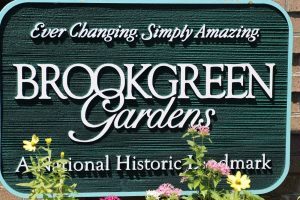Events
Brookgreen Gardens to Celebrate Black History Month with Programs
Brookgreen Gardens, a leading conservator of South Carolina Lowcountry history, will host educational programming and special exhibitions in addition to their year-round Lowcountry History exhibits to celebrate Black History Month. The site of four former rice plantations, Brookgreen pays homage to the enslaved people who worked the land and their descendants, known as the Gullah Geechee community.
“Black History Month is an important time for us to teach about the people who lived and worked on these lands before the Huntingtons founded what is now Brookgreen Gardens,” says Brookgreen Gardens President and CEO Page Kiniry. “We hope during February, and throughout the year, we continue to make thought-provoking cultural programming and experiences accessible to those living in and visiting the Lowcountry.”
Programs
Gullah Customs, Language, and Remedies, February 8
Local Gullah historian, Glander Pressley, will talk about the customs, traditions, and language of the Gullah culture and discuss the natural medicinal home remedies used within the culture. Pressley interprets the history of enslaved captives from the West Coast of Africa who were trafficked to various locations to plant sugar cane, cotton, and tobacco and cultivate rice.
The Gullah Geechee Legacy of Jazz, February 11
College of Charleston professor Karen Chandler, Ph.D., will host a 60-minute lecture about the history of the Jenkins Orphanage in Charleston. Founded by Rev. Daniel Jenkins, the orphanage created a haven for Black orphans and formed the Jenkins Orphanage Band as a fundraising effort. The band went on to incubate the talents of famous African American musicians, position Southern Jazz to the rest of the world, and even create a new dance step that would come to define the “Roaring Twenties.”
Sankofa Sculpture, February 11
Ron Daise, cultural interpreter and writer, will dedicate the Sankofa sculpture and present information about Adinkra symbols. The three colorful Adinkra sculptures of the “Sankofa” exhibit were created by Daniel J. Kraus of Murrells Inlet. Adinkra are visual symbols from Ghana, West Africa, that represent concepts or original thoughts that reflect parts of life. Two sculptures portray “Sankofa” in the shapes of a bird and of a heart. It translates “Return and Get It” and symbolizes “learn from the past.” The third portrays “Gye Nyame,” which translates “Except for God” and symbolizes “supremacy of God.”
Special Exhibitions
Collectively Disconnected by Arun Drummond, January 7 – March 31
A collection of works by Lowcountry artist Arun Drummond is displayed in the Wall Lowcountry Center. Drummond is the former manager of the Chuma Gullah Gallery, where his work premiered. He has spent nearly 20 years educating the public about the rich and truly unique culture of the coastal South. His work can be viewed in the historic Charleston City market as well as the Lybensons art gallery at the Gullah Geechee Visitors Center on St Helena Island in Beaufort.
Exhibits & Tours
Silent Cities Cemetery Tours, Daily
These tours offer a rare opportunity to explore cemeteries at Brookgreen and learn about the historical burial customs of European and African origin. Tickets are $15 in addition to garden admission for this two-hour excursion.
The Lowcountry Trail
The Lowcountry Trail runs along the hillside overlooking Mainfield, a restored rice field of the former Brookgreen Plantation. Along the way, guests can listen to the accompanying audio tour that tells a 30-minute fictional story about life on Brookgreen Plantation. Along the trail, interpretive panels describe life on a rice plantation. Four stainless steel figures represent the plantation owner, the overseer, and an enslaved African male and female. These sculptures, created by Babette Bloch, an award-winning artist known for her site-specific works, serve as visually compelling landmarks to draw visitors along the trail and to interpret a revealing story about each one’s role in the economic and social system of a Lowcountry plantation.
Floyd Family Farm
The Floyd Family Farm exhibit is home to rare historic breeds of animals that would have existed during plantation times. Exhibiting animals like Marsh Tacky horses, Spanish Goats, and Red Devon cows helps sustain these rare breeds, increasing diversity and educating the public about the vital role of domestic animals in the state’s history.
Gullah Geechee Gaardin
Brookgreen’s Gullah Geechee Gaardin presents the culture and history of the Gullah Geechee people, descendants of enslaved Africans brought to the U.S. to produce cash crops like rice and cotton. The exhibit, open since 2018, presents cross-generational oral histories of Georgetown County’s Gullah Geechee residents through audio stations and written narratives.
For more information on Brookgreen’s programming, visit www.brookgreen.org.

























